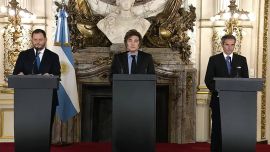Lending further weight to fears that Argentina is heading for a recession, the INDEC national statistics bureau revealed this week that in May economic activity dropped 5.8 percent year on year.
Registering a second straight monthly decline in economic activity, INDEC said the data indicated the economy shrank by 1.4 percent in May compared to the previous month, and 5.8 percent against May 2007. Reuters said that was the sharpest monthly decline witnessed since July 2009.
INDEC said agriculture and livestock were among the most-affected industries contributing to the slowdown, with one of Argentina’s worst droughts in decades pushing farming activity down 35 percent in the year-on-year comparison. Manufacturing (minus 1.4 percent) and transportation and communications (minus 4.9 pecent) were also hit hard.
“The decline of activity in May reflects not only the adverse weather shock over agricultural production but also the impact of tighter financial conditions over the broader economy,” Goldman Sachs economist Alberto Ramos said in a research note. “Overall, we see a very significant risk that the economy will experience a recession in 2018.”
The drought, the currency crisis and wider financial turmoil – including investors backing off from emerging markets – have all hit economic growth of late. In May, President Mauricio Macri’s government turned to the International Monetary Fund (IMF) for a US$50-billion financing deal in an attempt to strengthen the economy as the peso took a hit and with inflation currently in double digits.
President Macri has told Argentines that they will not suffer another economic implosion. But citizens continue to lose purchasing power to one of the world’s highest inflation rates, and many have staged protests against the government’s belt-tightening policies and involvement with the IMF, which include lay-offs of government workers and the slashing of subsidies on transportation and utility rates.
When the IMF confirmed the loan to Argentina back in June, the Macri government committed to reducing the country’s fiscal deficit to 1.7 percent this year and 1.3 percent in 2019. The IMF wants to see the Macri administration implement a programme of spending cuts to the tune of 300 billion pesos (US$10.7 billion).
IMF CUTS OUTLOOK
On Monday, the IMF slashed its growth outlook for Argentina from two to 0.4 percent of GDP in 2018. The IMF also cut its 2019 growth forecast for Argentina from 3.2 percent to 1.5 percent, while reiterating its position that the country’s economy with “gradually” rebound.
Speaking earlier in the week, Cabinet Chief Marcos Peña admitted in a brief television interview that “the next few months will be a bit more recessive,” conceding that the government may have made “the mistake of underestimating ... complexities.”
“The coming months are going to be a bit more recessive,” Peña said, expanding to say that drought had hit the agricultural sector hard, along with other “variables from outside.” The influential Cabinet chief said the coming months will be “a little more stormy and cold.”
INDEC also announced on Wednesday that the trade deficit in June narrowed to US$382 million, compared deficit of US$1.3 billion posted in May and the US$750 million registered in June 2017. The figure was driven by a decline in imports as the currency crisis hit economic activity.




















Comments